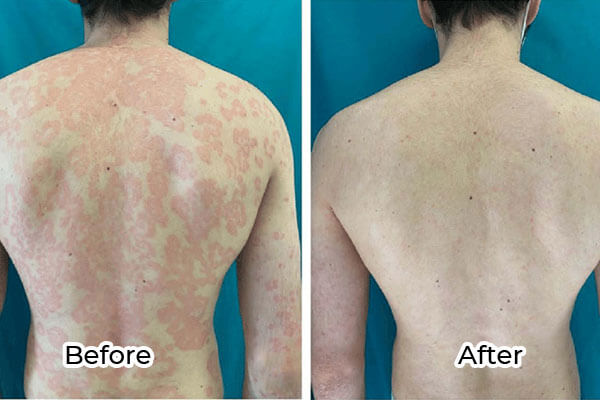Psoriasis is an immune-mediated disease that causes inflammation in the body. There may be visible signs of the inflammation such as raised plaques (plaques may look different for different skin types) and scales on the skin. This occurs because the overactive immune system speeds up skin cell growth. Normal skin cells completely grow and shed (fall off) in a month. With psoriasis, skin cells do this in only three or four days. Instead of shedding, the skin cells pile up on the surface of the skin. Some people report that psoriasis plaques itch, burn and sting. Plaques and scales may appear on any part of the body, although they are commonly found on the elbows, knees, and scalp.
Psoriasis Signs and Symptoms can vary from person to person. Common signs and Symptoms include:

Psoriasis is a chronic disease that flares up and subsides intermittently. While there is no cure for psoriasis there are many ways to manage the symptoms.Treatments to manage symptoms include:
Topical treatments and light therapy are typically reserved for milder instances of psoriasis. Medication is typically used in the strongest cases, when psoriasis has not responded adequately to these first two treatments.
At Eudermiz, one of the specialist dermatologist clinics in Hyderabad, we will assess your Psoriasis condition and choose the best treatment based on the type and severity of your case of psoriasis. Wherever the affected skin is, our doctors will start with the mildest treatments before possibly progressing to stronger ones if needed. Our goal is to slow cell turnover and accompanying skin irritations with the fewest possible side effects.
Call us to book an Appointment for Psoriasis Treatment at Eudermiz, our mobile no. Is +91-63055 35324, and our clinic phone no. is , you can also email us for an appointment. Our email ID is - contact@eudermiz.com
The signs and symptoms of psoriasis can vary from one to one. Common signs and symptoms include:
Psoriasis plaques can range from a few dandruff-like scaly patches to major rashes that cover enormous areas. The most commonly affected areas are the lower back, elbows, knees, legs, soles, scalp, face, and palms.
Because psoriasis can resemble other skin diseases, doctors sometimes find it difficult to diagnose it. Health care providers may need to use a microscope to examine a small skin sample before confirming a diagnosis.
In many cases, there is a family history of psoriasis. Researchers who have studied a large number of families affected by psoriasis have identified genes linked to the disease. People with psoriasis may notice times when their skin worsens, called flares, before improving. Infections, stress, and weather changes can cause flares. Also, certain medicines may trigger an outbreak or worsen the disease.
Doctors generally treat psoriasis in steps based on the severity of the disease, size of the areas involved, type of psoriasis, and where the psoriasis is located. Options can include:
Yes, psoriasis can change from one type to another depending on its extent of spread and trigger factors.
e.g. If a patient is having psoriasis limited to scalp, any trigger factor can cause it to spread on trunk (Red raised irregular patches of Plaque PS) , or on palms or soles (Plantar PS), or on joints ( PSA), or on fold areas of body like axilla, groins( Inverse PS) or all over body.
The unpredictable nature of Psoriasis makes treatment challenging for many people. A wide range of treatments is available. No single Psoriasis treatment works for everyone, but something will work for most people. It is hard to predict what will work for a particular individual; however, it is important to be open-minded and willing to work with your doctor to find a treatment that will work for you.